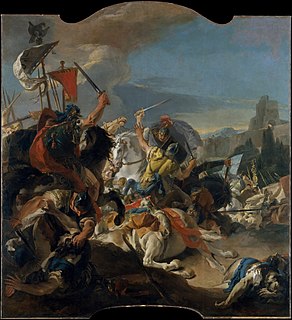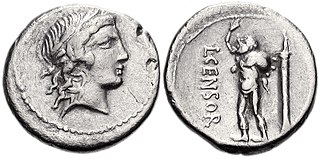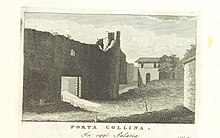Year 82 BC was a year of the pre-Julian Roman calendar. At the time it was known as the Year of the Consulship of Marius and Carbo. The denomination 82 BC for this year has been used since the early medieval period, when the Anno Domini calendar era became the prevalent method in Europe for naming years.
Quintus Sertorius was a Roman general and statesman who led a large-scale rebellion against the Roman Senate on the Iberian peninsula. He had been a prominent member of the populist faction of Cinna and Marius. During the latter years of the civil war of 83–81 BC, he was sent to recover the Iberian Peninsula. When his faction lost the war he was proscribed (outlawed) by the dictator Sulla. Supported by a majority of the native Iberian tribes, Sertorius skillfully used irregular warfare to repeatedly defeat various commanders sent by Rome to subdue him. He was never decisively beaten on the battlefield and remained a thorn in the Senate's side until his murder in 73 BC.

Lucius Cornelius Sulla Felix, commonly known as Sulla, was a Roman general and statesman. He won the first large-scale civil war in Roman history, and became the first man of the republic to seize power through force.

The Social War, also called the Italian or Marsic War, was fought from 91 to 87 BC between the Roman Republic and several of its autonomous allies in Italy. The Italian allies wanted Roman citizenship, not only for the status and influence that came with it, but also for the right to vote in Roman elections and laws. They believed that they should be treated equally to the Romans, given that they had formed cultural and linguistic connections with the Roman civilization and had been their loyal allies for over two centuries. The Romans strongly opposed their demands, and refused to grant them citizenship, thus leaving the Italian groups with fewer rights and privileges.
Gnaeus Pompeius Strabo was a Roman general and politician, who served as consul in 89 BC. He is often referred to in English as Pompey Strabo, to distinguish him from his son, the famous Pompey the Great, or from Strabo the geographer.
Gnaeus Papirius Carbo was thrice consul of the Roman Republic.
The gens Pontia was a plebeian family at ancient Rome. Few members of this gens rose to prominence in the time of the Republic, but the Pontii flourished under the Empire, eventually attaining the consulship. Pontius Pilatus, as prefect of Judaea, is known for his role in the execution of Jesus.

The Battle of Vercellae, or Battle of the Raudine Plain, was fought on 30 July 101 BC on a plain near Vercellae in Gallia Cisalpina. A Germanic-Celtic confederation under the command of the Cimbric king Boiorix was defeated by a Roman army under the joint command of the consul Gaius Marius and the proconsul Quintus Lutatius Catulus. The battle marked the end of the Germanic threat to the Roman Republic.
Gaius Marius "the Younger" was a Roman republican general and politician who became consul in 82 BC with Gnaeus Papirius Carbo. He fought in Sulla's second civil war. He committed suicide that same year at Praeneste, after his defeat by Lucius Cornelius Sulla and during the city's capture by Quintus Lucretius Afella.
Lucius Julius Caesar was a Roman statesman and general of the late second and early first century BC. He was involved in the downfall of the plebeian tribune Lucius Appuleius Saturninus in 100 BC. He was consul of the Roman Republic in 90 BC during the Social War. During the war he commanded several Roman legions against the Italian Allies. He was awarded a Triumph for his victories on the Samnites at Acerrae.
Publius Rutilius Lupus was a consul of the Roman Republic in 90 BC.
Quintus Poppaedius Silo was a leader of the Italian tribe of the Marsi and one of the leaders of the Italian rebels during the Social War against Rome. Poppaedius was called the 'heart and soul' of the rebellion. He was a friend of Marcus Livius Drusus the Younger.
Gaius Carrinas was a Roman politician and general. Carrinas, as a leading member of the Marian party, fought in the civil war against Sulla. He is perhaps best known for commanding Populares forces at the Battle of the Asio River and the Battle of the Colline Gate where he was captured and executed by Optimate forces.
Sulla's civil war was fought between the Roman general Lucius Cornelius Sulla and his opponents, the Cinna-Marius faction, in the years 83–81 BC. The war ended with a decisive battle just outside Rome itself. After the war the victorious Sulla made himself Dictator of the Republic.

Marcius Censorinus was a name used by a branch of the plebeian gens Marcia of ancient Rome. The cognomen Censorinus was acquired through Gaius Marcius Rutilus, the first plebeian censor, whose son used it. The gens Marcia claimed descent from both Ancus Marcius, a king of Rome, and symbolically from Marsyas the satyr, who was associated with free speech and political liberty; see further discussion at Prophecy and free speech at Rome. The Marcii Censorini were consistent populares, supporting Marius, Cinna, Julius Caesar, and Antonius.

The Battle of Sacriporto also called the Battle of Scariportus took place in April of 82 BC during Sulla's Second Civil War. The battle pitted the Optimates under the command of Lucius Cornelius Sulla Felix against the Populares forces commanded by Gaius Marius the Younger. The battle resulted in a decisive Optimate victory.
The First Battle of Clusium was a battle that took place in June of 82 BC during the Roman Republic's Second Civil War. The battle pitted the Optimates under the command of Lucius Cornelius Sulla against the Populares commanded by Gnaeus Papirius Carbo. The battle was indecisive.
Gaius Marcius Censorinus was a late Roman Republican politician and soldier who participated in the first civil war of the Roman Republic, against Sulla.
The Battle of Tridentum took place in a valley just beyond Tridentum in the Autumn of 102 BC. The Germanic Cimbri almost succeeded in overrunning a Roman camp in the middle of the Roman strategical retreat. The Romans were saved by the heroic charge of the men from the Samnite legion which bought the rest of the army enough time to cross the river and escape. Despite some light losses a disaster was averted.
Pontius Telesinus was a leader of the Italic Samnites who spearheaded the last attempt of his people to resist domination by the Roman Republic. A fierce patriot, he was one of the rebel commanders in the Social War against Rome, leading the last remnants of the rebellion in southern Italy after the main uprising had already been suppressed. He intervened in the Roman civil wars of the 80s BC in an attempt to improve his and his people's position, but picked the losing side and was killed in 82 BC following the Battle of the Colline Gate against the Roman general Sulla.





